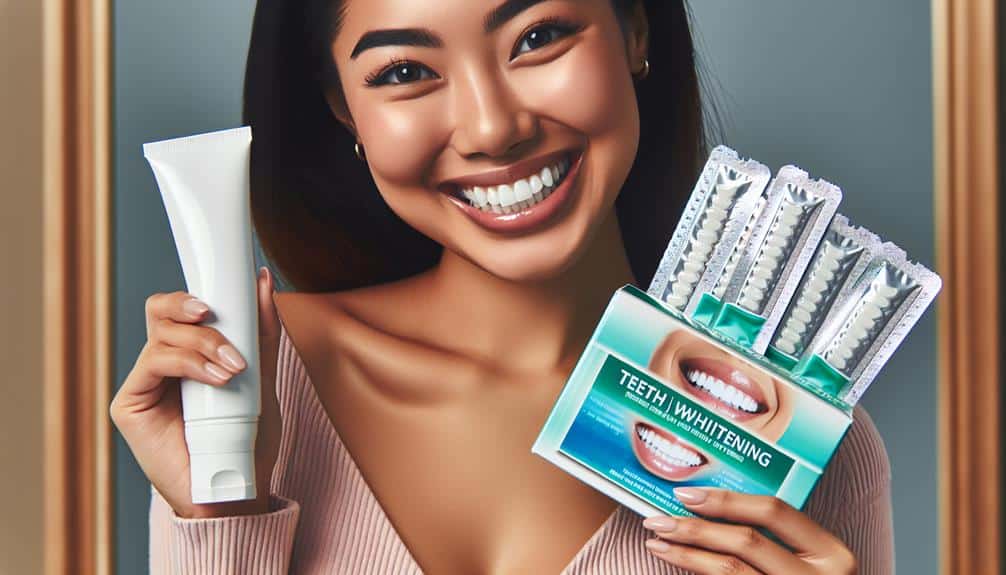Explore gentle whitening toothpaste options specifically designed for sensitive individuals, offering gradual results, enamel protection, and minimal sensitivity. Consider peroxide-free whitening strips with alternative ingredients like baking soda or charcoal for noticeable results without compromising on importance. Natural remedies such as oil pulling or charcoal toothpaste can be effective, but it's essential to consult with a dentist to avoid enamel damage.
Additionally, LED teeth whitening treatments and professional whitening gel alternatives with sensitivity prevention ingredients and customized trays can provide reliable results. Discover more about each solution to find the perfect match for your sensitive teeth.
Key Points
- Choose gentle whitening toothpaste for sensitive teeth and enamel protection.
- Consider peroxide-free whitening strips with alternative ingredients for noticeable results.
- Explore natural remedies cautiously for a gentle whitening effect.
- Opt for LED teeth whitening treatments for convenience and effectiveness.
- Consider professional whitening gel alternatives with sensitivity prevention ingredients.
Gentle Whitening Toothpaste Options
When searching for gentle whitening toothpaste options, consider products specifically formulated for sensitive teeth. These toothpastes are designed to provide effective whitening while minimizing sensitivity, making them ideal for individuals with delicate enamel.
One key feature to look for in these toothpastes is enamel protection. Enamel is the outer layer of the teeth and plays an important role in protecting them from decay and damage. Opting for a toothpaste that helps strengthen and protect enamel guarantees that the whitening process doesn't compromise the integrity of your teeth.
Additionally, gentle whitening toothpaste options are known for delivering gradual results. Unlike harsher whitening products that promise instant changes, toothpastes formulated for sensitive teeth work more gradually. This gradual approach not only helps prevent sensitivity but also provides a more natural-looking whitening effect.
Peroxide-Free Whitening Strips
Consider trying peroxide-free whitening strips for a gentle and effective way to brighten your smile without causing sensitivity concerns. Gel-free whitening solutions offer sensitive-friendly whitening alternatives that can help you achieve a whiter smile without the potential discomfort associated with peroxide-based products. These strips work by using alternative ingredients like baking soda or activated charcoal to remove surface stains on your teeth.
Peroxide-free whitening strips are designed to be gentle on your teeth and gums while still providing noticeable results. The absence of peroxide makes them a suitable option for individuals with sensitive teeth or those who prefer more natural whitening methods. When choosing peroxide-free whitening strips, look for products that have been clinically tested and proven to be effective in whitening teeth without causing sensitivity.
Natural Teeth Whitening Remedies
For a more natural approach to teeth whitening, explore the effectiveness of various natural teeth whitening remedies that can help brighten your smile without compromising sensitivity concerns.
Oil pulling, a traditional remedy, involves swishing oil around in your mouth to remove bacteria and promote oral health. While some claim it can help whiten teeth, scientific evidence is limited. However, oil pulling may contribute to overall oral hygiene.
Charcoal toothpaste has gained popularity for its potential whitening effects. Activated charcoal is abrasive and may help remove surface stains, but its long-term impact on enamel is debated. It's advisable to use charcoal toothpaste sparingly to avoid damaging the enamel.
Both oil pulling and charcoal toothpaste have their benefits and drawbacks. Oil pulling can be a good addition to your oral care routine, but it may not be a standalone solution for teeth whitening. Charcoal toothpaste can provide immediate whitening effects, but its abrasive nature raises concerns about enamel erosion. Consult with your dentist before incorporating these natural remedies into your whitening routine.
LED Teeth Whitening Treatments
LED Teeth Whitening Treatments utilize light technology to enhance the whitening process and achieve a brighter smile. These treatments are popular among individuals seeking effective and convenient solutions for teeth whitening.
Here are some key points to explore when examining LED Teeth Whitening options:
- Home LED devices: There are various at-home LED teeth whitening kits available in the market. These kits typically include a LED light device that's used in combination with whitening gel to brighten teeth in the comfort of your own home.
- Professional LED treatments: Dentists and specialized clinics offer professional LED teeth whitening treatments. These treatments often involve a higher concentration of whitening agents and the use of advanced LED technology to deliver faster and more noticeable results.
- Convenience: LED Teeth Whitening treatments are known for their convenience. Whether you choose to whiten your teeth at home or opt for a professional treatment, the process is usually quick and easy to incorporate into your routine.
- Effectiveness: LED technology has been shown to enhance the effectiveness of teeth whitening treatments by accelerating the chemical reaction that breaks down stains on the teeth's surface.
Professional Whitening Gel Alternatives
When exploring professional whitening gel alternatives for teeth whitening, individuals can opt for advanced formulations that offer effective and reliable results. One key consideration for those with sensitivity is choosing a whitening gel that includes ingredients aimed at sensitivity prevention. These gels often contain desensitizing agents like potassium nitrate or fluoride to help minimize any discomfort during and after the whitening process.
Another essential aspect to keep in mind is the use of customized trays when applying professional whitening gels. Customized trays are tailored to fit your teeth precisely, ensuring that the gel is distributed evenly and consistently across all surfaces. This not only enhances the whitening results but also helps in reducing the risk of gum irritation that can occur with ill-fitting trays.
Frequently Asked Questions
Are There Any Specific Ingredients in Gentle Whitening Toothpaste That Should Be Avoided for Sensitive Individuals?
When choosing gentle whitening toothpaste for sensitive teeth, avoid ingredients like harsh abrasives, strong bleaching agents, and high levels of peroxide. Look for products with potassium nitrate, fluoride, and low abrasiveness for safe whitening.
How Long Do Peroxide-Free Whitening Strips Typically Take to Show Noticeable Results?
When using peroxide-free whitening strips, results may vary, but typically noticeable changes can be seen within a few applications. The timing of results depends on individual sensitivity levels and the effectiveness of the product.
Can Natural Teeth Whitening Remedies Cause Sensitivity or Irritation for Those With Sensitive Teeth?
Like a gentle breeze on a summer day, natural remedies for teeth whitening can be effective for some, but caution is key for those with sensitivity. DIY solutions may carry side effects; research and consult.
Are LED Teeth Whitening Treatments Safe for Individuals With Sensitive Teeth or Gums?
LED teeth whitening treatments can be safe and effective for those with sensitivity concerns. To prevent discomfort, consider using desensitizing toothpaste or applying fluoride gel beforehand. Seek advice from your dentist to guarantee the best approach for your specific needs.
What Is the Average Cost Difference Between Professional Whitening Gel Alternatives and At-Home Whitening Options for Sensitive Individuals?
When comparing costs between professional whitening gels and at-home options, consider effectiveness and sensitivity levels. Professional treatments may cost more but often provide quicker, more noticeable results. At-home kits are more budget-friendly but can be gentler on sensitive teeth.



